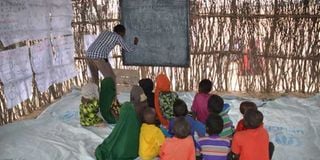Children drop out of school as drought worsens in Garissa

Pupils in Lagdera's Geylab mobile school learning in a makeshift classroom. Drought has forced pastoralists in Garissa County to move with their school going children as they search for water and pasture. PHOTO | ABDIMALIK HAJIR | NATION MEDIA GROUP
What you need to know:
- Enrolment in schools has sharply dropped as many of the pastoralists have migrated with their children.
- Transporting learning materials to where the pastoralists migrate has been one of the biggest challenges.
Many pupils in Garissa County have stopped going to school and joined their parents in search of water and pasture for their livestock as drought continues to ravage the region.
As the situation worsens, the Ministry of Education, in conjunction with non-governmental organisations, has established mobile schools that follow the pastoralists as they move with their children and livestock.
However, the efforts are faced by numerous challenges.
According Mr Ibrahim Rashid Odowa, the Lagdera deputy sub-county education officer, enrolment in schools has sharply dropped as many of the pastoralists have migrated with their children to places where they can get water.
“Parents have moved far away with their children to where they can get water for themselves and for their livestock. This has affected schools in this sub-county [and] enrolment has [gone down],” he told the Nation in Modogashe.
MAKESHIFT CLASSROOMS
Nation visited Geylab mobile school and found a few children in a makeshift classroom made of sticks with their teacher, Mr Absame Abdullahi Gure.
The teacher said the biggest challenge he faces is when parents move in different directions with their children in search of water and pasture for their animals.
He said transporting learning materials such as blackboards and charts to where the pastoralists migrate has been one of the biggest challenges in running the mobile schools.
NOT ENOUGH PUPILS
“Sometimes you are left alone as parents have withdrawn their children from the school and travelled in different directions where, even if you were to follow them, you can’t get enough children,” he said.
Hassan Ismail, a child protection officer with Womankind Kenya said there is need to increase the number of mobile schools in the region affected by drought while.
He was on an assessment tour of the situation in the area.
He said there is fear of wasting a whole generation of children if the government does not intervene to provide alternative learning mechanisms for their children who are affected by the current situation.





